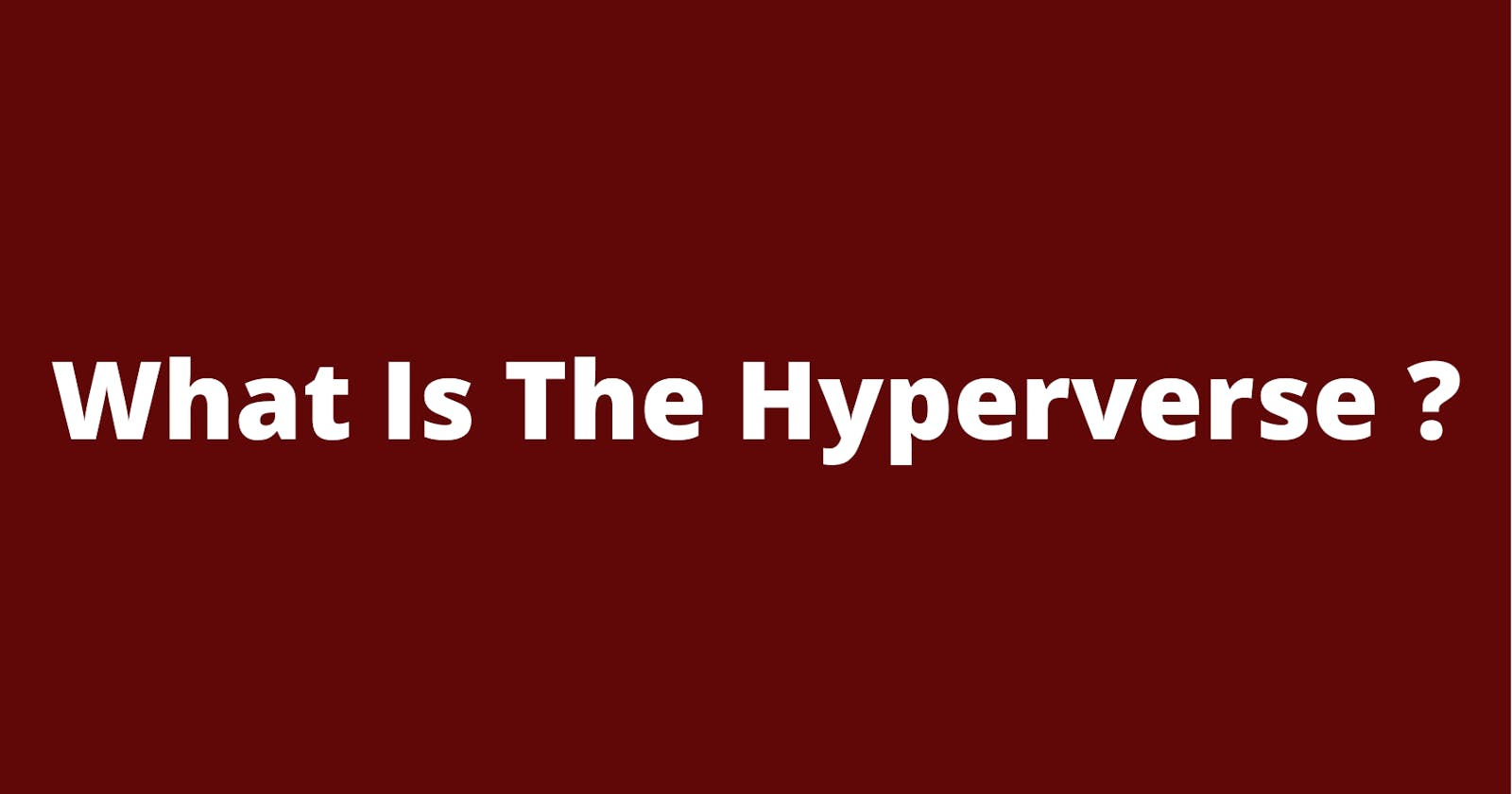Introduction
Falling into the Web3 rabbit hole not long ago is something that I don't intend to come out of anytime soon. The many things to learn, connections made, and juicy opportunities are more than enough reasons to keep me sufficiently engrossed in all things Web3.
Inside the Web3 rabbit hole, I discovered the seemingly yet unknown, or better put, the not very well-known keyword - hyperverse and learned about it from a very competent source. It is my greatest pleasure to share what I learned with you.
What is the hyperverse?
The hyperverse is an open, decentralized marketplace that is not tied to a single blockchain. This implies that it could work, not only with the ethereum blockchain but can also work with other blockchains like flow and algorand.
The Hyperverse is made up of four features:
Development
Security
Discoverability
Monetization
I would briefly talk about the four features for us to have a basic understanding of the hyperverse.
Development
Hyperverse developers create a critical feature of the hyperverse - smart modules, upon which decentralized applications are built. This makes it very easy for anybody transitioning from Web2 to Web3.
Security
Since nobody would want to use something that cannot be trusted. The hyperverse guarantees the security of smart modules by the staking of tokens on the smart modules by auditors. These staked tokens act as an insurance layer to the smart modules by making the auditors susceptible to losses in their staked tokens in the case of a defect in the smart module code. Nonetheless, the staking of tokens on the smart modules by auditors qualifies the auditors to earn in proportion to any revenue that is generated by the smart modules forever.
Discoverability
Since the hyperverse is decentralized, anybody on the hyperverse can be built a custom search experience which would help hyperverse developers to easily search for available smart contracts.
Monetization
To encourage the active participation of people in the hyperverse. Whosoever contributes in any way to a fee-based smart module or stakes tokens on it will be paid each time the smart module is used forever.
Since there is no hyperverse without smart modules. Let us elaborate more on smart modules.
What are smart modules?
Smart modules are complete foundational packages of smart contracts upon which decentralized applications can be built. It can also be understood as the back end upon which the front-end interface can be built.
Compare it to APIs which we use in Web2. The backend engineers create APIs, for example, the Google Map API, and front end developers who might not even be working for Google can consume the Google Map API and build their applications upon that API, without needing to create from scratch a geolocation API like Google Map API just for their application, and users with their unique data can interact with the API by typing in their desired locations.
Another example is the Unsplash API which many front-end developers consume to build their fancy picture gallery websites without having to take pictures of thousands of random people to create their random image gallery websites while adding extra functionalities to their websites apart from displaying random images.
In the case of smart modules, the Hyperverse engineers create smart modules, which are composed of a smart contract, metadata, unit tests, and documentation, which could be an NFT marketplace module, and the front end engineers create the UI which will enable different users to interact with those decentralized applications (dapps) with their unique data. In the Hyperverse, this ability of different users with their data to interact with the dapps built on smart modules is called "multi-tenancy".
Having had a good understanding of what the hyperverse is, what can I make out of it?
Doing some research for this article helped me to learn of and visualize many amazing things that could be done on the hyperverse. These include but are not limited to :
Twitter Smart Module
Twitter is one of my favorite social media applications. I understand it to be a platform where people can freely air their views, share their learnings and be real with the Twitter community without having to appear perfect or too professional to be taken seriously. This characteristic feature of Twitter made it possible for people to criticize poor government policies ( take for instance the popular #Endsars protest in Nigeria ) and even to create a large unsullied political followership among many other things.
However, many articles and reviews have shown the dissatisfaction of people with the user experience of the bird app. With many citing the censorship and banning of accounts whose opinions differed from other groups on Twitter.
With this controversy, I also dream of building a social media smart module on the hyperverse which is very similar to Twitter, and name it Dwitter ( Decentralized Twitter). This way any decision that will be taken will have to be a collective decision based on the majority of users.
NFT Search Engine Smart Module
First of all, what drew me into Web3 was Non-Fungible Tokens (NFTs). The story of people making money by selling pixelated artworks in the NFT marketplace. However, interviewing so many people and reading up different articles widened my horizon of the many possibilities of NFTs apart from the sale of artworks, and with this, I could imagine how applicable it could be to the hyperverse.
I would love to build an NFT search smart module on the hyperverse. With this particular smart module, a search engine is designed solely for the discovery of a particular type of NFT, be it art work NFTs, music NFTs, real estate NFTs, medical NFTs, ticketing NFTs, etc.
My motivation for desiring to do this is to create a more streamlined experience for users on the NFT marketplace in order to serve a more enjoyable and efficient experience for users in the marketplace.
Conclusion
My immense gratitude goes to those who read this article to the end. You can check out the Decentology page to learn more about what they have to offer.
My sincerest appreciation goes to the super team at Decentology starting from Nik Kalyani, Bekah, Samina, and Jacob for answering my never-ending questions on the Hyperverse, Web3, and NFTs, and for providing me with enough resources to enable me to understand what the hyperverse is all about.

